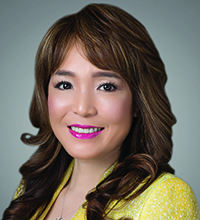Picture the home of any successful, high-powered character on popular television and it’s likely you’ll envision a luxury condo. In the current cultural moment, a high-end apartment is seen as the height of city living — literally and figuratively. But to sell these exclusive properties, clients need a knowledgeable agent to ensure they are apprised of all the small details before purchase.
So what’s the secret to selling these exceptional homes? Three leading agents weigh in with their top tips.
1. Market the home from all angles

Nancy Tassone, Senior Vice President, Sales, Jameson Sotheby’s International Realty
“The sale of a condo is multidimensional based on location, unit, and services and amenities,” says Nancy Tassone, Senior Vice President, Sales with Jameson Sotheby’s International Realty in Chicago. She points out that while most buyers are interested in the streamlined living that a luxury condo provides — a low-maintenance, often single-level sanctuary in the sky — for some, the most important aspect is the location, while others prioritize the bundled conveniences.

Michael L. Carucci, Executive Vice President, Gibson Sotheby’s International Realty
“I have marketing materials prepared not just for the condo, but for the building amenities, services, and offerings as well,” says Tassone. “For example, at a building that shares hotel amenities, I dedicate a portion of the marketing materials to list the homeowner benefits to buying in the building. Most buyers don’t know you often get a nice discount for the hotel spa, guest rooms, and restaurants.”
Michael L. Carucci, Executive Vice President of Gibson Sotheby’s International Realty in Boston, has seen firsthand the value this strategic marketing can add for his sellers. “We had a double unit at The Four Seasons last year that experienced a three-way bidding war. We traded $550K over the asking price,” he recalls.
2. Communicate an effortless lifestyle

Esther H. Park, Senior Vice President, List Sotheby’s International Realty
Esther H. Park, Senior Vice President with List Sotheby’s International Realty in Honolulu, puts it simply: “Understand the lifestyle and mentality of wealthy buyers for luxury condos.”
In other words, don’t just focus on the wow factor — the services, amenities, and location. Look at the why factor — why is your client in the market for these services? What are they hoping for and aspiring to?
“For luxury condo buyers, there comes a time when they no longer want to deal with the major home repair issues that homebuyers are responsible for; they want a living experience where everything is taken care of for them,” says Carucci. “Buyers of the private residences inside The Four Seasons One Dalton or The St. Regis Residences, Boston are drawn to the ability to retire there and call it their forever home, where they will have access to nearly every high-end amenity they could ever need.” At One Dalton, these amenities include a salon and golf simulator room with wet bar; at the St. Regis, a gym with personal trainers and a tranquil spa.
3. Know the neighbors
One thing you will often notice with your high-end condo buyers is that they are interested in knowing who already lives in the building. The reason is quite simple: fees.
“In the luxury market, a main concern among condo owners is the financial standing of their neighbors,” explains Carucci. “For example, in Manhattan, high-end condo buyers must have a certain number of dollars in equity to purchase certain luxury homes. With high-end condos, there are financial requirements for moving in, as condo fees alone can be notably high.”
For buyers of detached luxury homes, the financial capabilities of other homeowners in the area is less a cause for concern; for the luxury condo buyer, the affluence of the neighbors can indicate the price of a purchase over time.
“Know your stuff,” advises Tassone. “Not only every detail about the condo you are selling, but every detail of the building and neighborhood, and all the sales over the past few years in the building and nearby.” Leverage your network of colleagues and clients to keep informed on who is nearby, so that you can feed the curiosity of potential buyers when they ask.
4. Facilitate out-of-town transitions
Tassone observes that high-end condo buyers are different from single-family homebuyers because they are often making an intentional foray into downtown, big-city living. “Many condo buyers are coming from the suburbs or are looking for a part-time residence in the city,” she says. “I have a real understanding of the transition from the suburbs to the city, which is helpful when working with buyers and sellers. You have to appreciate how disruptive changing from a house to a condo can be.”
It’s not only suburban clients that come to the city for a luxury apartment either. “The majority of buyers for high-end condos I work with are international, versus luxury single-family homes,” explains Park. Indeed, much of the buzz around high-end luxury condos spreads through word of mouth and personal connections, because open houses are less common for properties of this stature and exclusivity. Keep your international clients in mind when condos come up for sale, so that they too have an opportunity to own one of these highly-prized properties.
5. For marketing, think editorial and exclusive
For both Tassone and Park, traditional media has helped them connect with new clients: articles and advertisements in high-end lifestyle magazines are attractive to buyers, while channels such as commercials and online resources can help to raise your profile as a luxury agent.
But sometimes, your strategy must be even more exclusive. “Luxury condos require very specific target marketing for potential buyers,” says Carucci. “You don’t merely put homes of this stature on the MLS — you must approach potential buyers directly, whether that’s by direct mail or networking. Networking is critical in targeting luxury condo buyers, as so many individuals who are buying in these buildings run in the same social circles and strive to play in the same league.”
When it comes to clients’ expectations for high-end condos, the sky’s the limit in more ways than one. Carucci offers sound advice for any agent: “Listen to your client and always follow through. Perhaps the most important thing we give to our clients is our attention to their needs. At a high-end luxury price point, buyers typically know what they want and sellers are set on their goals.”
In this market, your success will be governed by the knowledge you share, and the service you provide.
About Sotheby’s International Realty
Sotheby’s International Realty was founded in 1976 as a real estate service for discerning clients of Sotheby’s auction house. Today, the company’s global footprint spans 990 offices located in 72 countries and territories worldwide, including 43 company-owned brokerage offices in key metropolitan and resort markets. In February 2004, Realogy entered into a long-term strategic alliance with Sotheby’s, the operator of the auction house. The agreement provided for the licensing of the Sotheby’s International Realty name and the development of a franchise system. The franchise system is comprised of an affiliate network, where each office is independently owned and operated. Sotheby’s International Realty supports its affiliates and agents with a host of operational, marketing, recruiting, educational and business development resources. Affiliates and agents also benefit from an association with the venerable Sotheby’s auction house, established in 1744. For more information, visit www.sothebysrealty.com.
The affiliate network is operated by Sotheby’s International Realty Affiliates LLC, and the company owned brokerages are operated by Sotheby’s International Realty, Inc. Both entities are subsidiaries of Realogy Holdings Corp. (NYSE: RLGY) a global leader in real estate franchising and provider of real estate brokerage, relocation and settlement services. Sotheby’s International Realty Affiliates LLC and Sotheby’s International Realty Inc., both fully support the principles of the Fair Housing Act and the Equal Opportunity Act.
Source: click here














